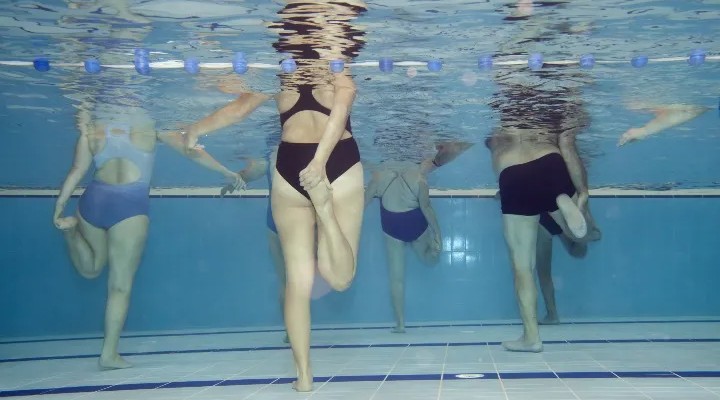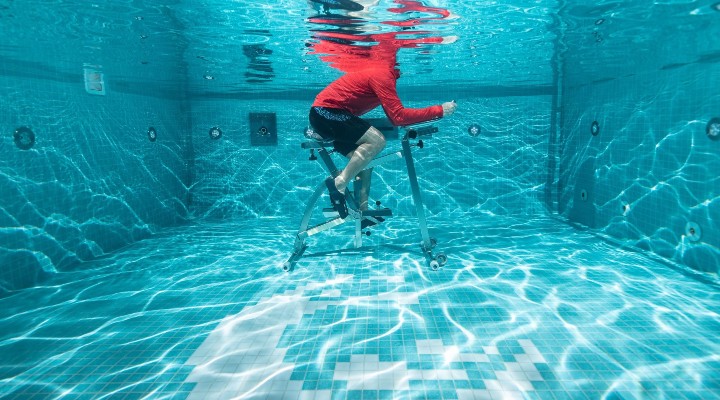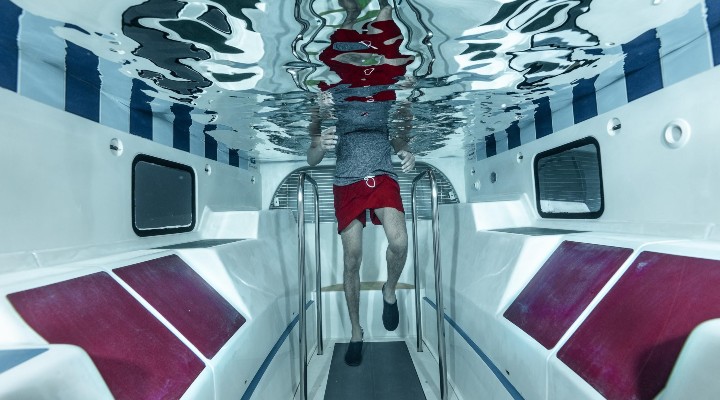How to manage knee pain with water therapy

Staying fit is the cornerstone of a healthy life. Maintaining a good exercise routine and staying fit is the key to longevity. According to Harvard University regular exercises help to control appetite, boost mood and improve sleep in the short term. Whereas, in the long term it reduces the risk of various lifestyle diseases like hypertension, diabetes, stroke and various heart diseases.
Knee pain can be a major obstacle in your fitness journey, especially when it comes to high impact, aerobic exercises. It may force one to consciously avoid joining workout routines with a fear of aggravating the symptoms at the knee.
The causes of knee pain ranges from a simple physical overexertion, trauma, injury to the ligaments, menisci, obesity to a more serious condition affecting the joint internally like arthritis.

Arthritis, in particular osteoarthritis is a degenerative condition that causes wear and tear of the joint and cartilage. Although it’s more commonly seen in the elderly population, however, owing to the current sedentary lifestyles and stress, the younger adults can also start showing early signs of arthritis.
Current Research and Evidence shows that exercise therapy may help in reducing the progression of knee osteoarthritis and recommend exercises as a first-line treatment for knee pain.
Exercising helps in reducing the stiffness, pain, increasing the muscle strength and mobility of the symptomatic joint.
However, in spite of a number of medical recommendations and researches, exercising a painful knee can lead to an increase in symptoms initially which may lead to retraction and discontinuation of therapy. This is where Aqua Therapy or hydrotherapy can come to the rescue and aid in the treatment journey.
What is Aqua therapy?

Aqua Therapy, earlier known as hydrotherapy is a form of physiotherapy wherein the therapeutic exercises are carried out in a therapy pool. The therapy is carried out one-on-one by a trained physiotherapist specializing in Aquatic Therapy. It utilizes the properties of water for therapeutic purposes.
Why Aqua Therapy?
The major benefit of carrying out exercises in water, is that the body weighs nearly 1/10th of its weight on land, which means that the overall load and stress on the weight-bearing joint is also reduced significantly making the joint feel much lighter in water compared to land.
The result is a pain-free exercise experience ensuring a higher compliance to therapy.
Apart from offloading the painful joint, Aquatic Therapy has the following other benefits:
- Reduction in Muscle tension and spasm- Aqua Therapy is carried out in a temperature-controlled warm pool. The warmth of the water eases out the muscle tension and spasm around the painful joint.
- Low-Impact Muscle strengthening- The natural Viscosity of water aids in providing a constant resistance to the exercising muscles. This helps in strengthening the weakened muscles along in a low-impact environment.
- Reduction in swelling- The hydrostatic pressure exerted by the water from all sides on the joint, have a positive effect in reducing the swelling and oedema.
- Low-Impact Aerobic conditioning- We know obesity can play a major role in aggravating and worsening any kind of knee pain. Aerobic exercises are the recommended form of exercises to lose weight. However, participating in land based aerobic exercises can increase the impact on the knee joint making it a painful experience. With Aquatic therapy, aerobic exercises can safely be carried out in water without the negative effects of high stress and impact seen on land. Equipment like underwater Treadmill, underwater bike, underwater elliptical, resistant floatation devices like Aqua dumbbells, Kickboards, Push plates etc can be used for targeting aerobicconditioning.
- Faster Recovery- Because of the pain-free nature of the therapy, functional exercises like squats, lunges, running etc can be carried out much sooner on water compared to land, reducing the overall recovery time.
What does current research say?
- A recent research conducted by Copenhagen University Hospital, Denmark analysed 13 clinical trials evaluating the efficacy of aquatic therapy exercises on 1190 patients with Hip and Knee OA and found that aquatic Therapy was effective in reducing pain, improving quality of life and reducing the level of disability in patients with hip and Knee OA.
- A research done in 2015, china conducted a systematic review of various studies evaluating Effectiveness of Aquatic Therapy in patients with Knee OA. The study included a total of 398 participants and concluded that Aquatic exercise had considerable benefits compared to land-based exercise and non-exercise in patients with Knee oA. The authors recommend Aquatuc exercise as an effective and safe medium for exercise in patients with knee OA






